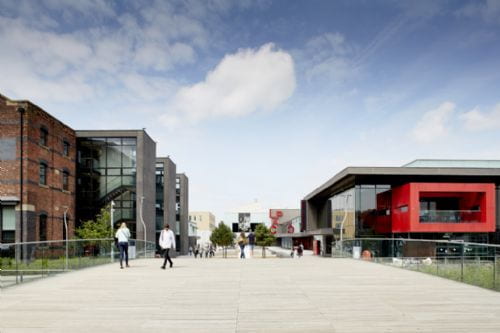University of Lincoln Pledges Commitment to Local Community
12 February 2019
The University of Lincoln has signed the new Civic University Agreement – a pledge to put Lincoln and Lincolnshire at the top of its list of priorities. The agreement is a key recommendation in a report published by the Civic University Commission set up by the UPP Foundation and chaired by the former Head of the […]

The University of Lincoln has signed the new Civic University Agreement – a pledge to put Lincoln and Lincolnshire at the top of its list of priorities.
The agreement is a key recommendation in a report published by the Civic University Commission set up by the UPP Foundation and chaired by the former Head of the Civil Service, Lord Kerslake.
The report sets out how universities like Lincoln have the capability, opportunity and responsibility to support the places where they are based in solving pressing issues ranging from helping businesses adapt to technological change, to boosting the health of local people, improving education and training and developing new civic leaders in fields from politics to the arts.
The agreement aims to help universities build on work many are already carrying out in these areas, working alongside councils, employers, cultural institutions, schools and further education colleges.
Since the University’s main Brayford Pool Campus was opened by Her Majesty the Queen in 1996, nearly £400m has been invested to provide a modern, student-centred environment.
As the second largest county in England, Lincolnshire has particular healthcare challenges with its rural geography and ageing population and has traditionally struggled to recruit and retain doctors and other healthcare professionals.
Lincoln Medical School is set to directly respond to the needs of the county and will welcome its first 80 students in September 2019. Within a few years, the School will be delivering first class medical training to around 400 students and a planning application has been submitted for a new dedicated teaching facility on campus.
University of Lincoln Vice Chancellor Professor Mary Stuart said: “The University of Lincoln exists because of the overwhelming support of our local communities so we understand completely our responsibility to the city and county.
“The University is now very much part of a rich heritage and we will continue to seek out local partnerships and collaborations to move forward to meet the opportunities and challenges of the 21st Century.”
Lord Kerslake said: “The civic universities of the Victorian era were founded as expressions of civic pride, and as a way of sharing knowledge and opportunity at a time of rapid change.
“We are now entering a new industrial revolution when it will be even more vital that knowledge is accessible in as many communities as possible.”
Richard Brabner, director of the UPP Foundation, said “This is an important report with concrete recommendations that all universities will want to consider.
“We know that many universities want to build engagement with the community around them. It’s excellent news that such an impressive list of institutions has already signed up and the UPP Foundation strongly endorses the report’s findings.”
The report warns that there is a danger that any cut in the resources available to universities – for example, a reduction in student fees without the deficit being made up in funding from the Treasury – will mean that work already being done in this area – like help provided to schools and further education colleges – could be slashed.
See the full report at:
https://upp-foundation.org
